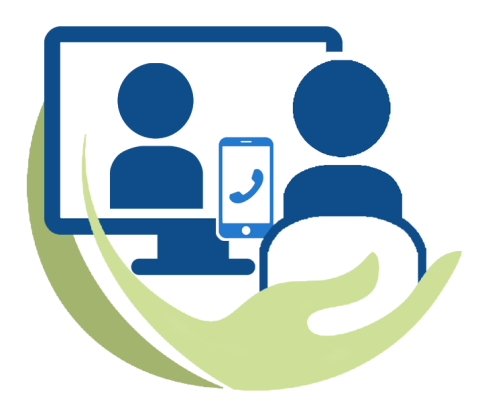Evaluation of Telehealth Services on Mental Health Outcomes for People with Intellectual Disabilities

What is this study about?
This study will compare START services when delivered in person or by telehealth.
In this study, people in the telehealth group will meet with their START team over the phone or computer for therapeutic coaching and outreach. Everyone will get intake, assessments and crisis response in person.
We want to know if both ways of providing START services reduces the use of crisis services and improves mental health. The information from this study can be used to improve telehealth services for people with intellectual and developmental disabilities and mental health conditions (IDD-MH) outside of START.
We know not all things work for all people. We will examine outcomes for people:
- With greater level of intellectual disability,
- In urban vs. rural communities, and
- Across racial, ethnic and linguistic groups.
Findings will determine the effectiveness of telehealth START practices across racial, ethnic, linguistic, and disability groups, as well as living contexts.
How does this study partner with people with IDD, their family members, and providers?
Our study team works together with community members to make sure this study is accessible, feasible, and focuses on outcomes that are important to people with IDD and their families.
Our Leadership Team, the group of people who run the study, includes a co-investigator with lived experience of IDD-MH.
The Engagement Team includes four people with IDD and mental health service experiences, two family caregivers, and a START provider. They co-design products for the research process, make sure our research is accessible, and help the team respond to research needs in real time.
Watch these videos to learn more about how the Engagement Team works together.
Our National Advisory Council includes people with IDD-MH, family caregivers, mental health clinicians, researchers, and representatives from policy, advocacy, or healthcare organizations. They provide targeted feedback about the implications of our results and outcomes.
We are engaged with START programs across the US to deliver START in-person or by telehealth.
What is telehealth?
Telehealth is a way to provide services to people using video, internet, or phone.
We designed this video and accompanying discussion guides for people with IDD, their families, and mental health providers. We want to make sure telehealth services work for people with IDD. People with IDD and mental health providers can work together, using the video and discussion guides, to make sure telehealth services meet each person’s needs.
With the help of research partners, the study team developed telehealth guidelines to provide best practices for activation of telehealth services and supports for people with intellectual and developmental disabilities and mental health service experiences (IDD-MH). It is available for download.
What is the Person Experiences Interview Survey (PEIS)?
The PEIS allows for persons with IDD to provide direct feedback about their mental health service experiences. This video is designed to describe the PEIS and explain how to use it.
The PEIS is free to use. If you would like the PEIS and users guide, please complete this form.
Publications
- Kalb, L.G., Kramer, J.M., Goode, T.D. et al. Evaluation of telemental health services for people with intellectual and developmental disabilities: protocol for a randomized non-inferiority trial. BMC Health Serv Res 23, 795 (2023). https://doi.org/10.1186/s12913-023-09663-6
- Peace Urquilla, Micah (2024) "The Person Experiences Interview Survey: A Measure Addressing Ableism in Mental Healthcare for Patients with Intellectual and Developmental Disabilities," Developmental Disabilities Network Journal: Vol. 4: Iss. 1, Article 3.
- Kramer, J.M., Beasley, J.B., Caoili, A., Kalb, L., Peace Urquilla, M., Klein, A., Poncelet, J., Black, S., & Tessler, R.C. (2023). Development and content validity of The Person Experiences Interview Survey (PEIS): A measure of the mental health services experiences of people with developmental disabilities. Frontiers in Psychiatry, 14, 1271210. https://doi.org/10.3389/fpsyt.2023.1271210
- Jessica M. Kramer, Evan E. Dean, Micah Peace Urquilla, Joan B. Beasley, Brad Linnenkamp; Collaboration With Researchers With Intellectual/Developmental Disabilities: An Illustration of Inclusive Research Attributes Across Two Projects. Inclusion 1 March 2024; 12 (1): 55–74. https://doi.org/10.1352/2326-6988-12.1.55
- Kramer, J. M., Beasley, J. B., Caoili, A., Kalb, L. G., Goode, T. D., & Peace Urquilla, M. (2025). Optimizing telehealth delivery for therapeutic activation for people with intellectual and developmental disabilities and mental health service experiences. Journal of Mental Health Research in Intellectual Disability, 18(2), 239-260. https://doi.org/10.1080/19315864.2025.2459413
Acknowledgements
The materials shared on this page were developed as part of the research study “Evaluation of Telehealth Services on Mental Health Outcomes for People with Intellectual and Developmental Disabilities” funded by the Patient Centered Outcomes Research Institute (Grant #14MN50).
Principal Investigator and Co-Principal Investigators
This work was led by Joan B. Beasley, University of New Hampshire (PI), Luke Kalb, Kennedy Krieger Institute (co-PI), Jessica Kramer, University of Florida (co-PI).
Co-Investigators
Tawara D. Goode, Georgetown University
Andrea Caoili, University of New Hampshire
Micah Peace Urquilla, University of New Hampshire
Collaborators
Richard Tessler, University of Massachusetts Amherst
Study Team at the Institute on Disability, University of New Hampshire
Luke Reynard, MBA, Financial Manager
Alex Parrish-Valliere, Grant Manager
Janie Poncelet, Research Assistant
Ann Klein, Data Management


